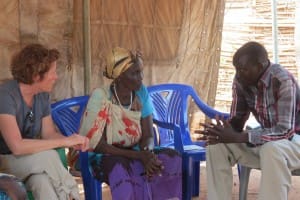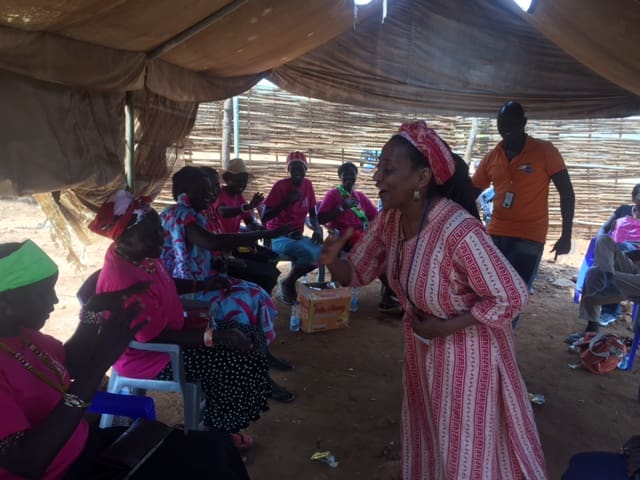South Sudan
The MBBI community is with the people of South Sudan as they work toward establishing peace and finding ways to recover from the recent violence in Juba, as well as ongoing fighting around the country. Through the work of the South Sudan team, the impact has been made more personal – we are grateful that our colleagues are safe, though many in our communities have fled and previous refuges have been attacked. The impact on so many is ongoing and remains disheartening. While the project is suspended for the time being, MBBI keeps the global community in our thoughts as so many work toward peaceful resolutions to conflict.
“We are trying to touch the hearts of the people of South Sudan.”
–John Kutiyote Mustapha, MBBI South Sudan Team Member
 Generations of South Sudanese have lived through wave after wave of violence. More than 2 million are displaced. Almost half the country faces food insecurity. Children have been forced to fight while other children are tortured. The UN Special Envoy on Sexual Violence says this is the worst sexual violence she has ever seen. MBBI’s South Sudan team recognizes that trauma plays a role in continuing the cycle of violence; hurting people hurt people. With that in mind, MBBI’s team of clinicians and peacebuilders seeks to increase resilience against incitement to fight, particularly among the new generation of South Sudanese youth.
Generations of South Sudanese have lived through wave after wave of violence. More than 2 million are displaced. Almost half the country faces food insecurity. Children have been forced to fight while other children are tortured. The UN Special Envoy on Sexual Violence says this is the worst sexual violence she has ever seen. MBBI’s South Sudan team recognizes that trauma plays a role in continuing the cycle of violence; hurting people hurt people. With that in mind, MBBI’s team of clinicians and peacebuilders seeks to increase resilience against incitement to fight, particularly among the new generation of South Sudanese youth.
Team Leaders: Mary Jo Harwood, Ginny Morrison
- LaVerne Baker Hotep
- Carol Bloom
- Sarah Dunne
- Tracy Kern
- John Kutiyote Mustapha
- Banureka Satkuneshwaran
- Shellie Vincent
Board Liaison: Charlie Pillsbury
Partners: Foundation for Democracy and Accountable Governance, Nonviolent Peaceforce, Solidarity with South Sudan
 MBBI South Sudan operates in the world’s newest nation, one whose infancy has been marred by violent conflict beginning in 2013, just two years after achieving independence. The violence and subsequent humanitarian crises have led to millions of people being displaced and devastating psychological trauma. In 2014, MBBI was invited by a group of concerned South Sudanese university students to look into ways to support healing within their communities. After completing an assessment of the country and conflict context, MBBI South Sudan is moving forward with a trauma-informed peacebuilding approach to begin to heal the psychological wounds afflicting the young nation.
MBBI South Sudan operates in the world’s newest nation, one whose infancy has been marred by violent conflict beginning in 2013, just two years after achieving independence. The violence and subsequent humanitarian crises have led to millions of people being displaced and devastating psychological trauma. In 2014, MBBI was invited by a group of concerned South Sudanese university students to look into ways to support healing within their communities. After completing an assessment of the country and conflict context, MBBI South Sudan is moving forward with a trauma-informed peacebuilding approach to begin to heal the psychological wounds afflicting the young nation.
MBBI South Sudan works closely with local partners in Central Equatoria State, focusing efforts in Protection of Civilians (POC) camps, which shelter tens of thousands of internally displaced people, as well as in two of the most deeply affected areas near the capital city of Juba. The project trains South Sudanese women, youth, and civil society on understanding trauma and practical, day-to-day support that promotes healing. Participants in the trainings learn the relationship between trauma and risk of violence, and they gain tools needed to resolve conflict nonviolently.
When the POC camps begin to close and people return to their homes, there is the potential for conflict between returnees and those living in their communities. By working with the South Sudanese in both the POC camps and in the greater-Juba area, MBBI South Sudan prepares these communities for reconciliation.
Ultimately, the South Sudan project aims to provide civil society members with the skills to support and teach others in their community. South Sudan has a rich cultural history and the project encourages trainees to pass on what they have learned in creative ways such as through theatre, music, and storytelling. MBBI South Sudan team members are honored to work within this vibrant cultural context and to collaborate with the people of South Sudan. As one team member observes, “The resilience of the South Sudanese people, there are no words to describe it. The pain is also there; I can feel that as well. I really believe our efforts are something that can make a difference.”
Please follow us on Twitter at @SSudanMBB and on Facebook at Mbb South Sudan
[metaslider id=6369]

